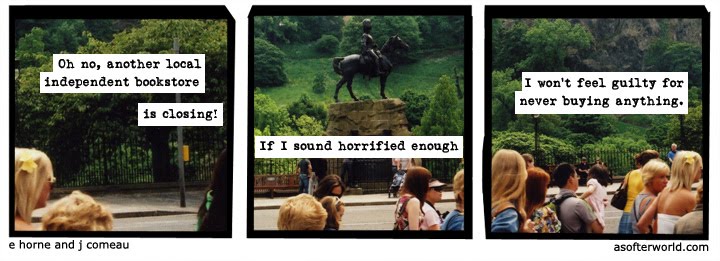The first issue involves an author an editor has worked with before. Say Editor A has published Book B by Author C. Author C's agent then continues to submit Author C's work to Editor A. Unfortunately, none of the work appeals to Editor A as much as Book B did. This could be for any number of reasons - different subject matter, different genre, not as well written, etc. Yet Editor A doesn't want to lose Author C as one of "their" authors. If Editor A continues to turn down Author C's manuscripts, the agent is no longer going to submit them to the editor. This would disappoint Editor A, because Editor A believes in Author C, and thinks Author C is capable of producing another book as good as Editor A thought Book B was. What's Editor A to do?
I was surprised at this situation, having never thought the continued working relationship between editor and author would be anything other than magical (naive, I know). What should/could/would an editor do in that situation? There's no hard-and-fast rule. Anyone in that situation has a number of options, including acquiring a book the editor is not as thrilled with, just to keep the author as one of "theirs" - perhaps they could work on it together to make it more like whatever the editor liked about Book B; not acquire anything and let the author go elsewhere; or perhaps an unorthodox option would be to talk to the author directly to inquire what else the author might be working on to see if there's anything similar to Book B (I thought of this one myself, so I don't know if it would really work).
The second issue is trickier, and is almost more philosophical or ethical than strictly editorial. Let me make it clear that this is a line of questioning I'm pursuing on my own, not in affiliation with any publishing company. In this scenario, Editor A purchased Book B from Author C. Though several people read the manuscript, it wasn't until after acquiring it that someone realized the manuscript for Book B was awfully similar to Movie Plot D. Names, characters, and general themes were changed, but the basic plot points were eerily similar. Now is that plagiarism of ideas or not? And if it is, what should the editor do? Book B is obviously going to be a huge hit for various reasons. To complicate matters, say Editor A has not worked with Author C before; therefore there is no rapport for Editor to say, "Look, Author C, what's up with this manuscript?" What's Editor A to do? Un-acquire Book B, a book that's sure to be a best-seller? Confront the unknown author and risk having Author C pull the project and hand it to a different publisher? Or ignore the similarities and publish it anyway?
I don't have a ready answer to this second issue myself. Does anyone have an opinion on this?
These are two of the major issues that stand out to me as particularly difficult to negotiate, and are probably indicative of the types of decisions editors deal with on a daily basis (though I imagine situation 1 is more common than situation 2, though I don't know for sure). While a part of me can not wait for the day when I have the power to make decisions like these, it is very clear to me that I will need years more experience before I feel comfortable handling a decision like that on my own. I'm very much looking forward to continuing to work my way up to that.

2 comments:
Interesting questions. What are the implications when it's Illustrator B who works with several different authors from different publishing houses because he has to pay his mortgage and feed his dogs? :D
That is perfectly understandable, and I fully support Illustrator B in his endeavors! :)
Post a Comment